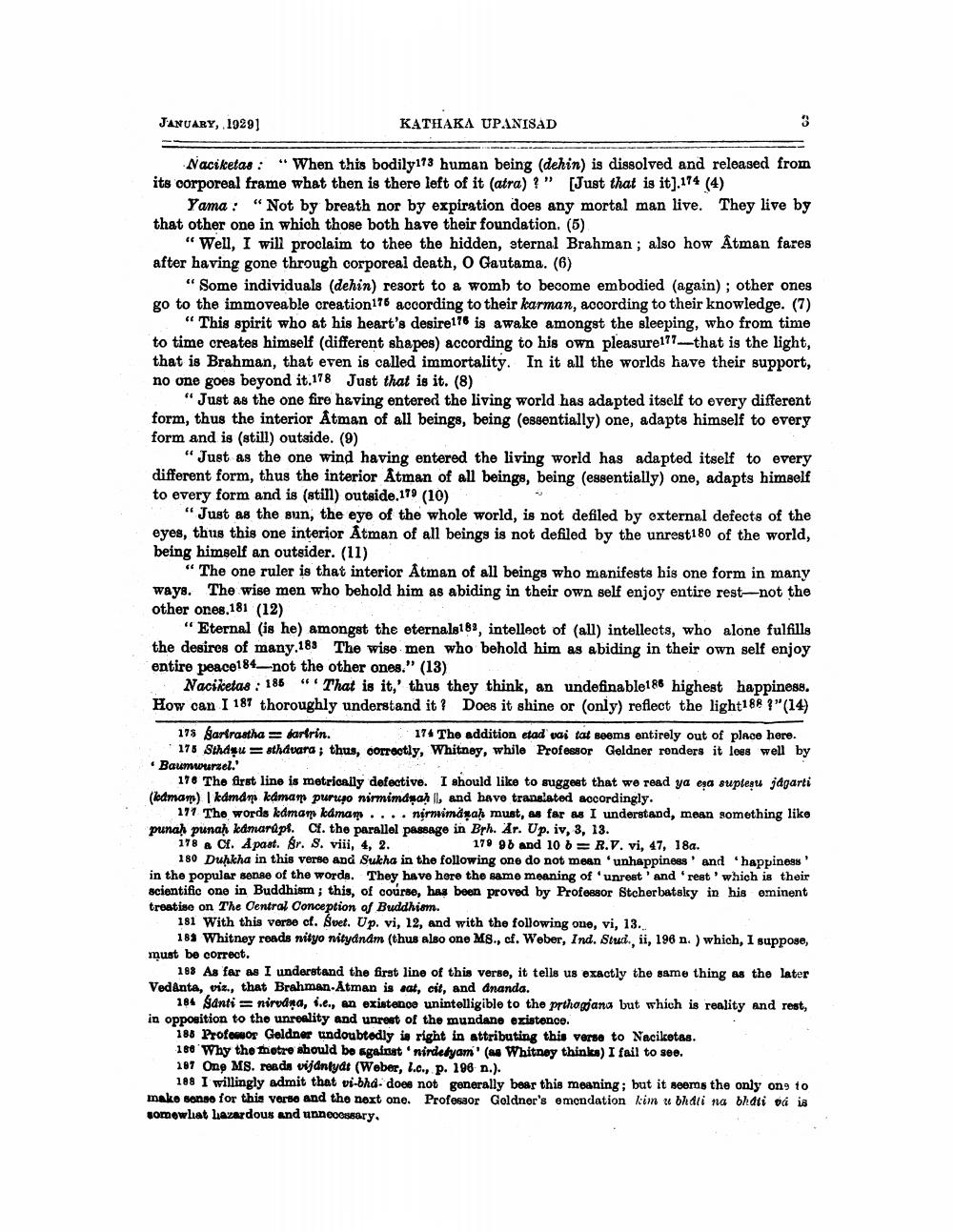Book Title: Indian Antiquary Vol 58 Author(s): Richard Carnac Temple, Charles E A W Oldham, S Krishnaswami Aiyangar, Devadatta Ramkrishna Bhandarka Publisher: Swati Publications View full book textPage 9
________________ JANUARY, 1929] KATHAKA UPANISAD 3 Naciketas: When this bodily173 human being (dehin) is dissolved and released from its corporeal frame what then is there left of it (atra)?" [Just that is it].174 (4) Yama: "Not by breath nor by expiration does any mortal man live. They live by that other one in which those both have their foundation. (5) "Well, I will proclaim to thee the hidden, eternal Brahman; also how Atman fares after having gone through corporeal death, O Gautama. (6) "Some individuals (dehin) resort to a womb to become embodied (again); other ones go to the immoveable creation175 according to their karman, according to their knowledge. (7) "This spirit who at his heart's desire176 is awake amongst the sleeping, who from time to time creates himself (different shapes) according to his own pleasure177-that is the light, that is Brahman, that even is called immortality. In it all the worlds have their support, no one goes beyond it.178 Just that is it. (8) "Just as the one fire having entered the living world has adapted itself to every different form, thus the interior Atman of all beings, being (essentially) one, adapts himself to every form and is (still) outside. (9) "Just as the one wind having entered the living world has adapted itself to every different form, thus the interior Atman of all beings, being (essentially) one, adapts himself to every form and is (still) outside.179 (10) "Just as the sun, the eye of the whole world, is not defiled by external defects of the eyes, thus this one interior Atman of all beings is not defiled by the unrest180 of the world, being himself an outsider. (11) "C The one ruler is that interior Atman of all beings who manifests his one form in many ways. The wise men who behold him as abiding in their own self enjoy entire rest-not the other ones.181 (12) "Eternal (is he) amongst the eternals183, intellect of (all) intellects, who alone fulfills the desires of many.183 The wise men who behold him as abiding in their own self enjoy entire peace184-not the other ones." (13) Naciketas: 185 "That is it,' thus they think, an undefinable186 highest happiness. How can I 187 thoroughly understand it? Does it shine or (only) reflect the light188 ?" (14) bartrin. 175 Sartrastha 174 The addition etad vai tat seems entirely out of place here. 175 Sthanusthavara; thus, correctly, Whitney, while Professor Geldner renders it less well by Baumwurzel.' 176 The first line is metrically defective. I should like to suggest that we read ya esa suplesu jagarti (kamam) | kámám kamam puruso nirmimasaḥ, and have translated accordingly. 177 The words kamam kamam.... nirmimarah must, as far as I understand, mean something like punaḥ punaḥ kamarápt. Cf. the parallel passage in Brh. Ar. Up. iv, 3, 13. 178 a Cf. Apast. Br. S. viii, 4, 2. 179 96 and 10 b R.V. vi, 47, 18a. 180 Duḥkha in this verse and Sukha in the following one do not mean 'unhappiness' and 'happiness' in the popular sense of the words. They have here the same meaning of 'unrest' and 'rest' which is their scientific one in Buddhism; this, of course, has been proved by Professor Stcherbatsky in his eminent treatise on The Central Conception of Buddhism. 181 With this verse cf. Svet. Up. vi, 12, and with the following one, vi, 13. 183 Whitney reads nityo nityandm (thus also one MS., cf. Weber, Ind. Stud., ii, 196 n.) which, I suppose, must be correct. 188 As far as I understand the first line of this verse, it tells us exactly the same thing as the later Vedanta, viz., that Brahman-Atman is sat, cit, and ananda. 184 Santi nirvana, i.e., an existence unintelligible to the prthogjana but which is reality and rest, = in opposition to the unreality and unrest of the mundane existence. 188 Professor Geldner undoubtedly is right in attributing this verse to Naciketas. 180 Why the metre should be against nirdesyam' (as Whitney thinks) I fail to see. 187 One MS. reads vijdntydt (Weber, l.c., p. 196 n.). 188 I willingly admit that vi-bhd- does not generally bear this meaning; but it seems the only one to make sense for this verse and the next one. Professor Goldner's emendation kim u bhati na bhati va is somewhat hazardous and unnecessary.Page Navigation
1 ... 7 8 9 10 11 12 13 14 15 16 17 18 19 20 21 22 23 24 25 26 27 28 29 30 31 32 33 34 35 36 37 38 39 40 41 42 43 44 45 46 47 48 49 50 51 52 53 54 55 56 57 58 59 60 61 62 63 64 65 66 67 68 69 70 71 72 73 74 75 76 77 78 79 80 81 82 83 84 85 86 87 88 89 90 91 92 ... 408
